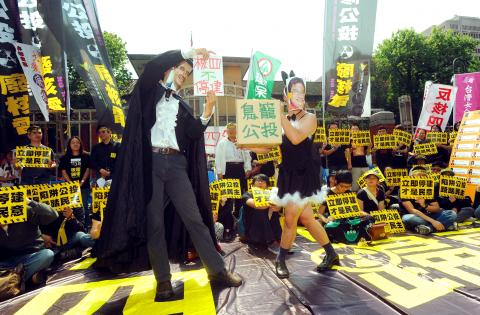The Executive Yuan yesterday said Taiwan will face electricity shortages, higher electricity rates and could invite international trade sanctions due to elevated carbon dioxide emissions if the incomplete Fourth Nuclear Power Plant in New Taipei City’s (新北市) Gongliao District (貢寮) is scrapped.
Halting construction of the controversial plant could also lead to a slump in the stock market and political and economic instability, the Executive Yuan said in a brochure compiled by the Ministry of Economic Affairs yesterday.
Written in a question-and-answer format, the brochure lists 25 arguments often raised by anti-nuclear activists to demand an immediate halt to the plant, followed by counterarguments.

Photo: Wang Yi-sung, Taipei Times
The pamphlet aims to convince the public that Taiwan needs to finish building the plant if it is to embark on a path to a low-carbon environment and a nuclear-free homeland.
According to the brochure, halting the project would put the nation at risk of having to ration electricity from 2015, when the unused capacity is estimated to be between 5 percent and 10 percent, with the risk intensifying to a real threat in 2018.
If the power plant does not become operational next year as scheduled, electricity prices will increase by 35 to 42 percent in 2016 and by 13 to 15 percent in 2018 compared with the rates recorded in October this year, the brochure says.
The Executive Yuan insisted that the plant is capable of producing the cheapest energy in Taiwan, at a price of less than NT$2 per kilowatt-hour, adding the costs of nuclear waste disposal and the decommissioning of the plant is included in the electricity price.
If the plant is abandoned, the nation would have to increase its reliance on fossil fuels — likely coal and gas — to meet electricity demand, the brochure says.
The problem of meeting the growing demand for energy cannot be immediately solved with alternative energy sources due to the various obstacles and difficulty of developing solar, wind or geothermal energy, the brochure says.
In that case, Taiwan wouid emit an additional of 7.51 million to 16.19 million tonnes of carbon dioxide per year, rendering it impossible for the country to reach its target of reducing emissions, the Executive Yuan said.
The brochure includes a section that seeks to address safety issues in which it rebutts an article published by Nature magazine in April 2011 that ranked two of Taiwan’s plants in a list of the world’s three most dangerous nuclear power plants.
The operational performance of Taiwan’s nuclear reactors have been rated above world standards by the International Atomic Energy Agency, it said.

Chinese Nationalist Party (KMT) Chairman Eric Chu (朱立倫), spokeswoman Yang Chih-yu (楊智伃) and Legislator Hsieh Lung-chieh (謝龍介) would be summoned by police for questioning for leading an illegal assembly on Thursday evening last week, Minister of the Interior Liu Shyh-fang (劉世芳) said today. The three KMT officials led an assembly outside the Taipei City Prosecutors’ Office, a restricted area where public assembly is not allowed, protesting the questioning of several KMT staff and searches of KMT headquarters and offices in a recall petition forgery case. Chu, Yang and Hsieh are all suspected of contravening the Assembly and Parade Act (集會遊行法) by holding

PRAISE: Japanese visitor Takashi Kubota said the Taiwanese temple architecture images showcased in the AI Art Gallery were the most impressive displays he saw Taiwan does not have an official pavilion at the World Expo in Osaka, Japan, because of its diplomatic predicament, but the government-backed Tech World pavilion is drawing interest with its unique recreations of works by Taiwanese artists. The pavilion features an artificial intelligence (AI)-based art gallery showcasing works of famous Taiwanese artists from the Japanese colonial period using innovative technologies. Among its main simulated displays are Eastern gouache paintings by Chen Chin (陳進), Lin Yu-shan (林玉山) and Kuo Hsueh-hu (郭雪湖), who were the three young Taiwanese painters selected for the East Asian Painting exhibition in 1927. Gouache is a water-based

Taiwan would welcome the return of Honduras as a diplomatic ally if its next president decides to make such a move, Minister of Foreign Affairs Lin Chia-lung (林佳龍) said yesterday. “Of course, we would welcome Honduras if they want to restore diplomatic ties with Taiwan after their elections,” Lin said at a meeting of the legislature’s Foreign Affairs and National Defense Committee, when asked to comment on statements made by two of the three Honduran presidential candidates during the presidential campaign in the Central American country. Taiwan is paying close attention to the region as a whole in the wake of a

OFF-TARGET: More than 30,000 participants were expected to take part in the Games next month, but only 6,550 foreign and 19,400 Taiwanese athletes have registered Taipei city councilors yesterday blasted the organizers of next month’s World Masters Games over sudden timetable and venue changes, which they said have caused thousands of participants to back out of the international sporting event, among other organizational issues. They also cited visa delays and political interference by China as reasons many foreign athletes are requesting refunds for the event, to be held from May 17 to 30. Jointly organized by the Taipei and New Taipei City governments, the games have been rocked by numerous controversies since preparations began in 2020. Taipei City Councilor Lin Yen-feng (林延鳳) said yesterday that new measures by